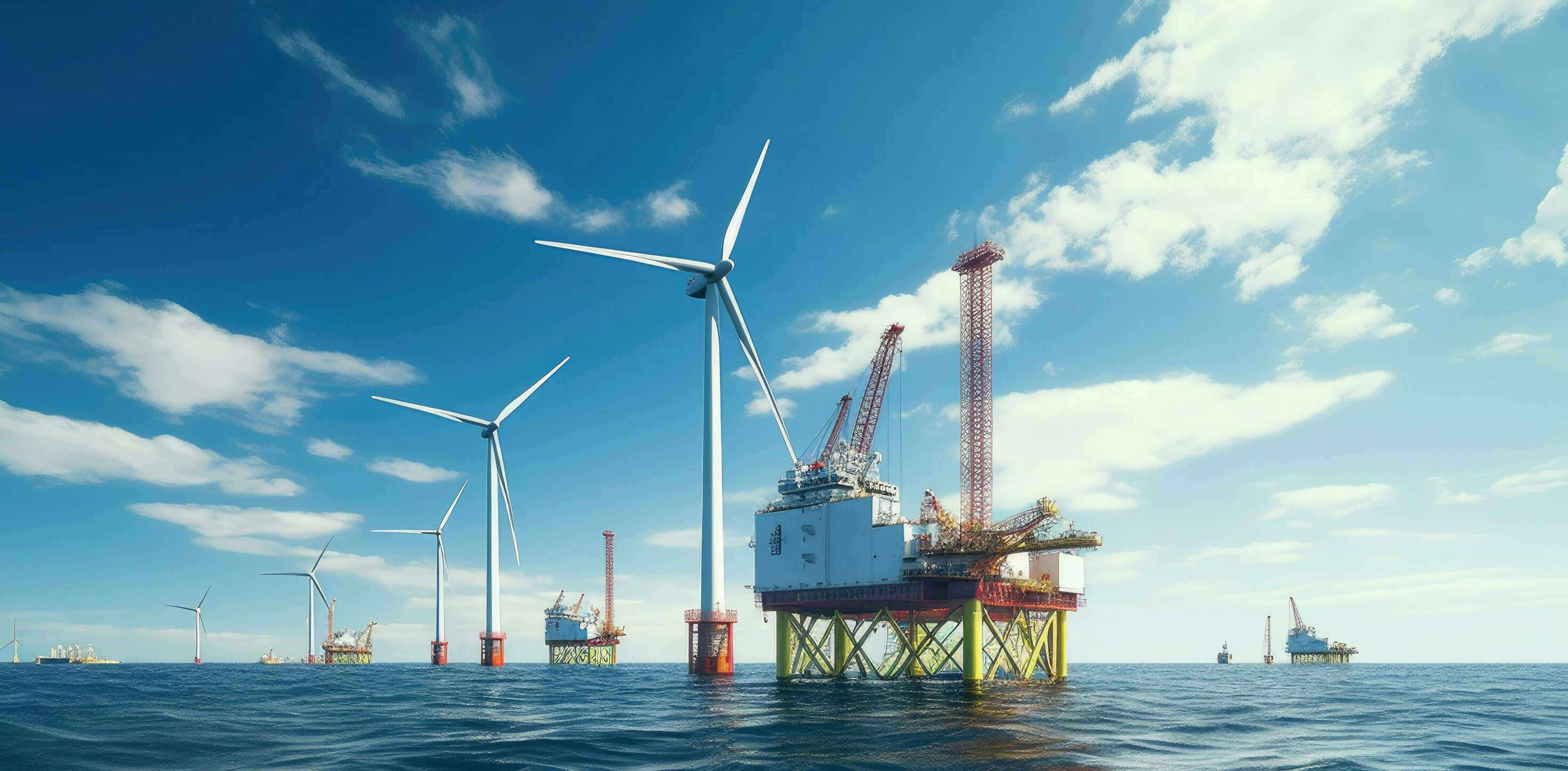Transitioning Onshore Talent to Offshore Marine Jobs
10 Apr, 202510 minutes
The offshore and marine sectors are essential to economies worldwide because they are at the center of the development of global infrastructure and energy. Due to the quick expansion of offshore projects such as wind farms and oil rigs, the need for qualified workers is increasing dramatically. Finding these employees is difficult, especially considering the specialised knowledge needed for offshore marine jobs.
Transferring talented onshore workers to offshore marine jobs is one solution that is gaining a lot of traction. Because of their many transferable skills, onshore professionals are very valuable in an offshore setting. When implemented properly, this shift helps hiring managers develop an adaptable offshore workforce while also benefiting employees who are keen to pursue new career paths.
Let's explore the process, benefits, and considerations involved in transitioning onshore talent offshore:
Onshore vs. Offshore Work in the Marine Sector
Stepping off solid ground and onto a platform surrounded by ocean is not a minor adjustment. Transitioning from onshore to offshore marine work presents a distinct shift in environment, schedules, and lifestyle.
Key Differences in Work and Living Conditions
Onshore jobs generally allow workers to return home daily or weekly, offering stability and proximity to family life. Offshore marine jobs, by contrast, are more isolated, often requiring workers to live on oil rigs, service vessels, or wind installations for weeks at a time. Rotations typically follow a schedule of two or three weeks offshore, followed by an equal amount of rest onshore. Shifts offshore are intensive, often running up to 12 hours per day, with every worker contributing to the 24/7 operation of the facility.
Living conditions offshore are compact and communal. Workers sleep in shared quarters, dine together, and often face limited personal space. For onshore workers who are accustomed to daily commutes and are more independent, this can be a significant adjustment.
Summary
Commute & Family Life
Onshore: Daily or weekly return home; better family life balance.
Offshore: Extended periods away; rotational schedules.
Work Schedule
Onshore: Standard shifts with evenings typically free.
Offshore: 12-hour shifts in a continuous 24/7 operation.
Living Arrangements
Onshore: Private housing, more independence.
Offshore: Shared living quarters, communal facilities.
Environment
Onshore: Greater personal space, familiar routines.
Offshore: Isolated, confined, and communal lifestyle.
What is the Impact of these Differences?
The jump from onshore to offshore positions requires careful planning. Adaptability becomes critical for those taking on offshore marine jobs, as they must acclimate to unfamiliar routines, environments, and the mental demands of being away from loved ones for extended periods. Adjustments also extend to increased safety protocols. Offshore environments are inherently challenging, often remote and exposed to unpredictable weather conditions, meaning safety compliance takes precedence in every task.
With proper preparation, however, many onshore workers find these challenges an exciting opportunity for growth, offering rewarding career prospects and often higher salaries.
The Importance of Offshore Certifications and Training
Hiring managers place a high premium on candidates meeting offshore requirements. Strict procedures are in place to guarantee safety and compliance in the heavily regulated marine industry. Offshore ertifications and accreditations must be carefully considered when moving onshore talent offshore.
The Essential Offshore Certifications
To work offshore, several industry-standard qualifications must be secured. Among the most critical are:
- Basic Offshore Safety Induction and Emergency Training (BOSIET): An industry-standard course that equips workers with knowledge in safety procedures, emergency response, and survival skills.
- Helicopter Underwater Escape Training (HUET): Often included within BOSIET, this training prepares workers for the hazards of helicopter transport, common in offshore marine jobs.
- Maritime and Coastguard Agency (MCA) Qualifications: Depending on offshore marine jobs, workers may require MCA certifications for navigation, marine engineer jobs, or catering positions.
- Role-Specific Qualifications: Trades like welding, electrical work, or marine engineer jobs demand professional accreditations and proof of competency. For example, an onshore electrician transitioning offshore may need additional offshore certifications in hazardous area electrical installation.
- Health and Safety Training: Given the high-risk setting, comprehensive health and safety knowledge is non-negotiable.
Challenges When Transitioning to Offshore Work
Recruiting onshore talent into offshore roles requires awareness of unique challenges these individuals may face. Proactively addressing these obstacles ensures a smoother transition and greater retention within your workforce.
1. Physical and Mental Demands
The high demands of offshore work require the highest level of physical fitness. Employees need to be able to climb platforms, withstand inclement weather, and act quickly in an emergency. Frequent physical examinations, like offshore medical exams, guarantee they are healthy enough to carry out their offshore marine jobs.
Being alone at sea for weeks can have a negative psychological impact. Long work hours and little communication with loved ones require emotional resilience, which can be developed via planning and mentoring. Employers can have a big impact on new hires' success by providing support programs like team-building exercises and access to mental health services.
Solutions:
- Regular physical fitness training and pre-assignment medical assessments.
- Mental health resources such as counselling and helplines.
- Pre-deployment preparation programs to build emotional resilience.
- Mentorship schemes to support new offshore workers.
- Scheduled communication windows to stay connected with loved ones.
- Social and team-building activities onboard.
2. Logistical Adjustments
Offshore life is not as straightforward as kicking off a shift on land. Workers new to the sector must learn processes like air travel by helicopter, conducting emergency evacuation drills, or understanding the layout of offshore platforms. Employers should provide comprehensive onboarding to educate onshore recruits about these complexities.
Solutions:
- In-depth onboarding programs focused on offshore logistics and protocols.
- Hands-on training for emergency procedures and evacuation drills.
- Virtual tours or simulations to familiarise new workers with platform layouts.
- Travel coordination support and guidance for helicopter and vessel transfers.
3. Salary and Benefits Adjustments
While offshore positions often pay well above onshore jobs due to the demands and risks involved, workers may initially be uncertain about these changes. Transparent communication on salary structures, benefits, and additional compensation like allowances for living offshore helps manage expectations and build trust.
Solutions:
- Clear, upfront communication on pay scales and offshore allowances.
- Breakdown of total compensation, including benefits and bonuses.
- Regular salary reviews and opportunities for progression.
- Guidance from HR or talent partners on financial planning and contracts.
Benefits of Offshore Marine Recruitment Partners like Select
Making the switch to offshore work is not entirely the worker's responsibility. Offshore marine recruitment agencies like us are essential in helping to close the gap between qualified workers and offshore opportunities. We make sure that clients and candidates are ready for the particular requirements of offshore environments by focusing on long-term results and having extensive industry knowledge.
By serving as a reliable intermediary between employers and talent, we facilitate more seamless transitions, quicker mobilisation, and long-term success for all parties.
Benefits of our offshore marine recruitment agency include:
- Role alignment and skills matching: In order to place candidates where they will succeed, we look at more than just credentials. We also take personality, flexibility, and experience into account.
- Support for certification and compliance: To make sure candidates are ready and in compliance, we walk them through crucial offshore requirements like BOSIET, medicals, and other industry certifications.
- Customised onboarding experiences: Working with employers, we assist in creating onboarding initiatives that get new hires ready for life offshore, including team dynamics and travel arrangements.
- Check-ins and assistance after placement: After placement, our relationship continues. To guarantee long-term success and retention, we offer continuous support, frequent touchpoints, and feedback loops.
Career Pathways for Onshore Workers Moving Offshore
One of the most rewarding aspects of offshore work is the potential for growth. Career pathways within the sector are well-defined, offering clear progression from entry-level roles to senior positions. For hiring managers, the key lies in identifying onshore workers with compatible skills and demonstrating how these can be applied effectively offshore.
According to research, Offshore Wind Leasing Round 5 will award rights for three floating wind farms in the Celtic Sea, generating enough energy to power over 4 million homes. After three years of consultations with governments, industry, and other groups, the farms could create 5,000+ jobs and provide a £1.4 billion economic boost, with more opportunities in the supply chain.
This figure highlights the growing demand for skilled workers in the offshore industry. As offshore wind farms expand, roles such as labourers, electricians, engineers, and catering staff will be vital to supporting these new projects. With thousands of job opportunities emerging in the offshore wind sector, there are increasing chances for onshore workers to transition into these roles, contributing to the industry's growth and success.
Common Onshore Roles Suited for Offshore Marine Jobs
Several roles stand out for their transferability into offshore marine jobs:
- Labourers: Experienced onshore labourers possess physical endurance and the ability to work in high-pressure, physically demanding environments. Offshore, these skills apply directly to roles such as roustabouts or deck crew members.
- Electricians: The expertise of onshore electricians in systems troubleshooting makes them vital for offshore operations. They maintain and repair electrical components on wind farms, oil platforms, and other installations.
- Offshore catering jobs: A less obvious but equally important role, offshore catering jobs are around to ensure offshore crews are well-nourished and living comfortably during rotations. The skills of onshore chefs and stewards are easily transferable to offshore kitchens.
- Engineers: Technical problem-solvers are always in demand offshore, where operational efficiency depends on their ability to overcome challenges. Engineers skilled in mechanics or systems design can transition seamlessly to marine engineer jobs managing platform machinery or developing offshore wind systems.
Transferable Skills
Key transferable skills are essential for success in offshore roles, regardless of the specific job title. These abilities help individuals adjust quickly to the demands of offshore life and contribute effectively within high-performing teams.
Core transferable skills include:
- Adaptability: Ability to adjust to changing environments, shift patterns, and extended time away from home.
- Teamwork: Comfortable working closely with others in confined, collaborative settings where trust and communication are vital.
- Problem-solving: Capable of thinking on their feet and resolving issues in high-pressure, resource-limited situations.
- Physical resilience: Strong stamina and fitness to meet the physical demands of offshore tasks.
- Emotional resilience: Mental toughness to handle isolation, long hours, and tight-knit communal living.
- Situational awareness: Understanding surroundings and responding quickly to potential safety risks or operational changes.
- Communication skills: Clear and respectful interaction with team members to ensure smooth operations and safety.
Key Takeaways: Transitioning Onshore Talent Offshore
Transitioning from onshore to offshore work is a significant step, but with the right preparation and support, it can lead to a highly rewarding and sustainable career path. While the shift in environment, routine, and expectations can be challenging at first, many workers find the experience energising, both professionally and personally.
For employers, tapping into onshore talent offers a smart solution to ongoing workforce shortages in the offshore sector. By recognising the value of transferable skills and investing in proper onboarding and support systems, companies can build agile, high-performing offshore teams that thrive in demanding environments.
Looking for an Expert Offshore Marine Recruitment Agency?
Whether you're an employer ready to expand your offshore marine workforce or a skilled onshore professional considering the switch, we’re here to support your journey. With a deep understanding of both the challenges and opportunities in the offshore sector, we specialise in matching the right people with the right offshore marine jobs.
Reach out today to explore how we can help you.
